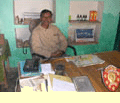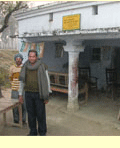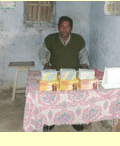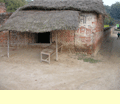
Harnessing the Profit Motive
“Villagers appreciate that we are selling family planning commodities. And when someone is benefited, he conveys it to another person. This is the way the number of clients has increased.”
For Indigenous Systems of Medicine Practitioners (ISMPs) in Uttar Pradesh, selling name-brand contraceptives has provided excellent motivation to offer family planning counseling to their clients. Blending traditional systems such as Unani, Ayurveda and homeopathy with allopathic medicine, thousands of ISMPs provide most of the primary-level curative health services in Uttar Pradesh. In their daily practice, ISMPs charge clients for medicines and other tangible items but not for counseling or advice.
By training ISMPs to provide counseling, contraceptive pills or condoms, and referrals for clinical contraceptive methods, the PRIME II Project assists the State Innovations in Family Planning Services Agency in implementing a USAID-funded program to increase use of family planning in India’s most heavily populated state. More than 12,000 ISMPs in 15 districts of Uttar Pradesh have been trained through the program since 1995.
Post-training follow-up tests have shown that ISMPs’ knowledge and skills in family planning counseling for informed choice remain strong, with over 80 percent consistently performing to standard. The number of eligible clients receiving family planning services from ISMPs has been lower than desired, however. A performance needs assessment conducted by PRIME in 1999 revealed that ISMPs needed motivation to offer counseling along with more reliable supplies of commercial-quality contraceptives, better linkages with referral agencies, and increased community awareness of their capabilities in family planning counseling and services.
Data from the assessment informed a new strategy for training and supporting the ISMPs. Because contraceptive sales could generate self-sustaining motivation to offer family planning counseling, a commodity sales and marketing component was added to the training curriculum and follow-up support. Changes were also made in the existing medical supply chain in one district to ensure that commercial contraceptives are easy for ISMPs to obtain.
In December 2002 and January 2003, PRIME II conducted a qualitative study in two districts where elements of the new strategy have been implemented and supported. During interviews, ISMPs who sell contraceptives report that sales are profitable and client load has increased. Return visits from family planning clients for other services have provided additional motivation for the ISMPs to offer counseling.
Implementing agency support, including emphasis on sales during training and an initial supply of salable contraceptives, has proven critical to the success of the program. This is particularly true since interviewed clients express a preference for name-brand contraceptives over free government-supplied commodities. “I purchase from the ISMP,” said one consumer. “We were using free condoms but when I used the purchased one I realized that it is better. It is softer and has lubrication. It increases the pleasure.”
As satisfied customers recruit new clients for family planning counseling and services, ISMPs have the opportunity to make a reasonable profit as well as a positive contribution to local life by increasing the use of family planning to space births and prevent unwanted or mistimed pregnancies. As an ISMP from Sultanpur district sums up, “We decided to sell for the benefit of the people—and also for us.”
The PRIME II Project works around the world to strengthen the performance of primary-care providers as they strive to improve family planning and reproductive health services in their communities.
PRIME Voices #17, India: Enabling Indigenous Providers Who Sell Contraceptives, 3/26/03.
|














